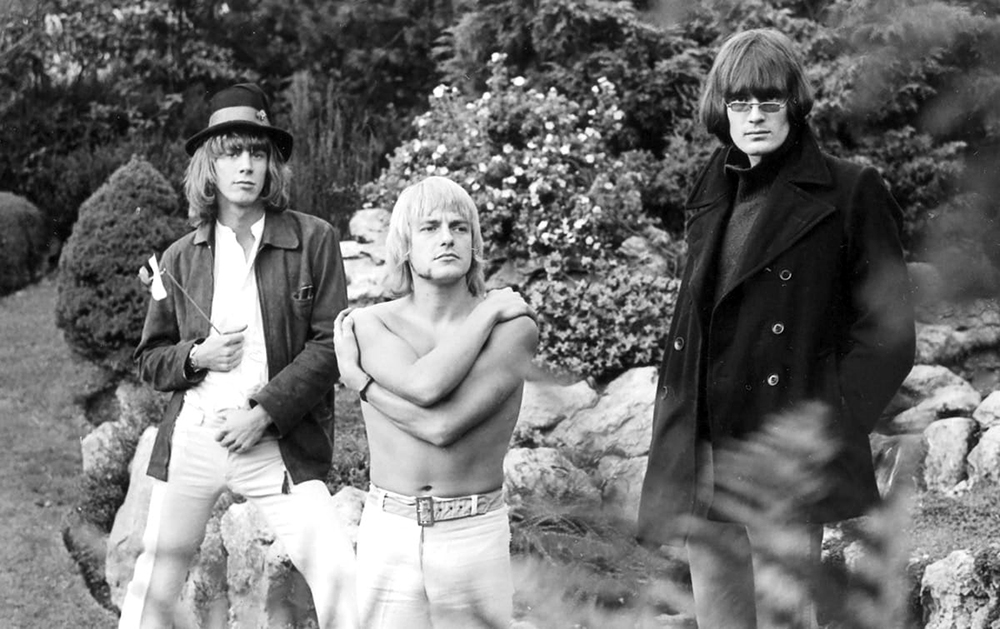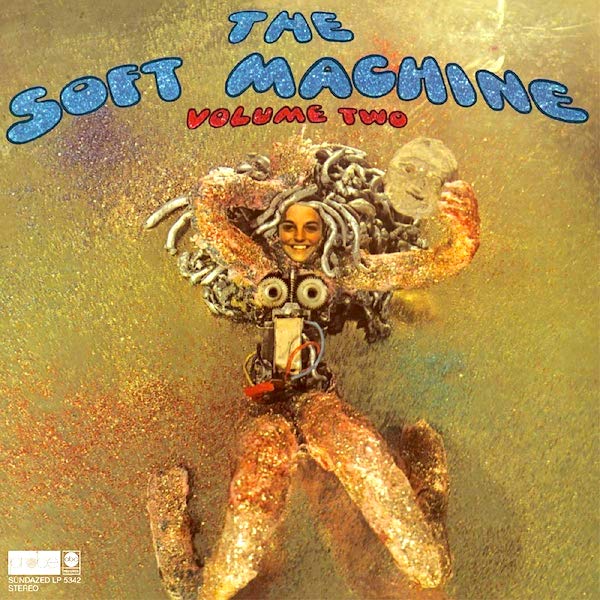Pynchon Music: Soft Machine
I cut radio static into the control music and festival recordings together with sound and image track rebellion. “Cut word lines—Cut music lines—Smash the control images—Smash the control machine—Burn the books—Kill the priests—Kill! Kill Kill!”
—William S. Burroughs, “The Soft Machine”
Soft Machine (1966–present)
To fans of prog music, bringing up the “Canterbury Scene” is like mentioning a delightfully-obscure vintage to a wine connoisseur, or whispering the word “Cornell” to a Deadhead. It evokes a wistful sigh, a faraway look, a reverential nod of the head—“Yes, yes, that’s the stuff, oh, what a time, what a place!”
The time was the late 1960s, and the place was Canterbury, England. Famous for its great cathedral, Canterbury has been a center of English music since the days of Thomas Tallis. While some of the musicians who would form the 1960s Canterbury Scene were born in Kent County, others only attended school there, and some were actually Australian or even American. Nevertheless, Canterbury became associated with a collection of intertwined bands with shared members, the kind of thing to send Peter Frame into twitching fits. They developed their chops playing London’s underground clubs—the Speakeasy, the UFO Club, Middle Earth—and even wandered into the studio on occasion.
Unlike distinct genres such as “acid rock” or “symphonic rock,” the Canterbury sound was more an aesthetic approach shared among a group of like-minded musicians. It was both eccentric and eclectic, borrowing elements from classical music, jazz fusion, psychedelia, space rock, and progressive folk. Extended improvisation and sonic experimentation were highly valued, and the music tended to favor minor keys and complex harmonies. A passage of pastoral gentility could quickly give way to the clamor of dark, Satanic mills. While none of the bands that emerged from the Canterbury Scene attained the same level of commercial success and lasting popularity as Genesis, Yes, or King Crimson, many developed cult followings that persist to this day; bands like Hatfield and the North, National Health, Caravan, Gong, Camel, Khan, Egg, and Centipede. But the most famous of these was the Soft Machine, formed in 1966 by Robert Wyatt, Kevin Ayers, Daevid Allen, Larry Nowlin, and Mike Ratledge. The group borrowed their named from a William S. Burrough novel; the first rock band to have done so, but certainly not the last.
By the time the Soft Machine was ready to record their first LP in 1968, Nowlin had left the band and Daevid Allen found himself stranded in Paris, where he founded Gong. Now reduced to a core trio, the band recorded The Soft Machine, a seminal work of British prog informally known as Volume One. Swapping Hugh Hopper for Kevin Ayers on bass, Volume Two arrived a year later, offering longer and even more experimental tracks. Third was more fusion-oriented, and officially dropped the definite article from the band’s name. This was naturally followed by Fourth and Fifth, and so on, each successive release embracing a more jazz-oriented sound. The band was changing, too, as old members departed and new ones came onboard. By the time Soft Machine broke up in 1984, the band contained no original members. This breakup was followed by numerous side projects and partial reformations; far too many to mention here, but all featuring a stellar cast of musicians. In 2018 they reformed again as Soft Machine to release Hidden Details, explicitly an album of jazz fusion. Like the Ship of Theseus, Soft Machine sails on, more a musical idea than a fixed band of musicians—not unlike the Canterbury Scene itself.
Pynchon Connection
Soft Machine’s Pynchon connection is found on their second album, Volume Two (1969). Side two is dominated by a jazz-rock suite entitled “Esther’s Nose Job,” named after an episode in Thomas Pynchon’s first novel, V. (Though for some reason, the suite was only named on the American issue of the album; the British version merely listed the song titles.) A staple of their early live shows, “Esther’s Nose Job” was written by keyboardist Mike Ratledge.
The five-part suite opens with the appropriately-titled “Fire Engine Passing with Bells Clanging.” A cacophonous barrage of instruments, the intro represents Soft Machine at their most chaotic. Wyatt’s frenzied drumming takes center stage here, rolling back and forth above Hopper’s bubbling bass and Ratledge’s stuttering keyboards. This bit of “tuning-up” concludes with a swell of organ, and we’re drummed straight into “Pig.” It’s here things really come together, a propulsive rhythm banged out on piano and drums shaping a backbone for the remaining ten minutes of music. The lyrics are delivered rapidly, dropped haphazardly over the staggered beat and trailing away with a warbling chorus—Theo Travis would later refer to Wyatt’s singing as “jazz vocal with a British accent.” The only part of the suite with lyrics, “Pig” may not reference Pig Bodine directly, but it’s easy to imagine he’d share the singer’s sentiments—“Virgins are boring / What’s so smart about the time wasted? / Time that could be spent completely nude, bare, naked?” Salacious stuff indeed; and what better music to seduce virgins than a twelve-minute prog suite?
The appearance of horns blows “Pig” into “Orange Skin Food,” the highlight of the suite. A driving instrumental fueled by a deliriously repetitive sax riff, the group is playing at their tightest here, and Hopper’s bass is superb: a fuzzed-out bottom supporting an uncredited guitar solo; but then again, it could also be a double-tracked Hopper playing against himself. This dense flow of prog magma continues through “Door Opens and Closes,” which features a return of Wyatt’s vocals in a Canterbury version of scat. A sudden transition brings us to “10:30 Returns to the Bedroom,” introduced by an upbeat ostinato on keyboards undercut by a restless, churning bass growling at the bottom of the mix. The most lengthy part of the suite, “Bedroom” features another manic drum solo before Ratledge lays down some Keith Emerson-style key pounding. A sustained organ chord in full cathedral mode brings “Esther’s Nose Job” to its satisfying conclusion.
A further arrangement, without lyrics, was made for a larger jazz ensemble and broadcast on the BBC on 29 November, 1969, and can be found on Triple Echo, a three-record anthology released by Harvest Records in 1977. Another live version of “Esther’s Nose Job” was recorded at the BBC Proms at the Royal Albert Hall on 13 August 1970, and was released as a bonus track on the 2007 Sony remastered and expanded edition of Third. It was the first time a rock band had been invited to play the Proms. According to Robert Wyatt:
This brings us to another, well if not a Pynchon connection, perhaps a Pynchon synchronicity. A former student of Karlheinz Stockhausen, the BBC producer Tim Souster (1943–1994) was a noted electronic musician and composer himself. In 1983 Souster produced The Transistor Radio of St Narcissus, an electroacoustic piece inspired from The Crying of Lot 49, a book which mentions Stockhausen by name. So maybe it wasn’t just the music alone on Volume Two that earned Soft Machine their chance to offend the “posh music establishment?”
Lyrics
“Pig”
Got more sexy than the tights girls are wearing
But even there, weren’t the time wasted
Time that could be spent completely nude, bare, naked?
Virgins are boring
They should be grateful for the things they’re ignoring
What’s so smart about the time wasted
Time that could be spent completely nude, bare, naked?
Knickers and panties
We are groping under knickers and pants
But is it worth it, all that time wasted?
Time that could be spent completely nude, bare, naked?
With nothing on at all
Nothing, no clothes on
Nude, naked bare…
Additional Information
Rivmic Melodies:
1. Pataphysical Introduction – Pt. 1 (1:00)
2. A Concise British Alphabet – Pt. 1 (0:10)
3. Hibou, Anemone and Bear (5:58)
4. A Concise British Alphabet – Pt. 2 (0:12)
5. Hulloder (0:52)
6. Dada Was Here (3:25)
7. Thank You Pierrot Lunaire (0:47)
8. Have You Ever Bean Green? (1:23)
9. Pataphysical Introduction – Pt. 2 (0:50)
10. Out of Tunes (2:30)
1. As Long as He Lies Perfectly Still (2:30)
2. Dedicated to You But You Weren’t Listening (2:30)
3. Esther’s Nose Job:
a) Fire Engine Passing with Bells Clanging (1:50)
b) Pig (2:08)
c) Orange Skin Food (1:52)
d) Door Opens and Closes (1:09)
e) 10:30 Returns to the Bedroom (4:14)
Mike Ratledge—piano, Lowrey Holiday De Luxe organ, Hammond organ, harpsichord, flute.
Hugh Hopper—bass, acoustic guitar, alto saxophone.
Robert Wyatt—drums, lead and backing vocals.
Brian Hopper—soprano and tenor saxophone.
Pynchon on Record
Return to the main music page
Last Modified: 23 November 2021
Main Pynchon Page: Spermatikos Logos
Contact: quail(at)shipwrecklibrary(dot)com



